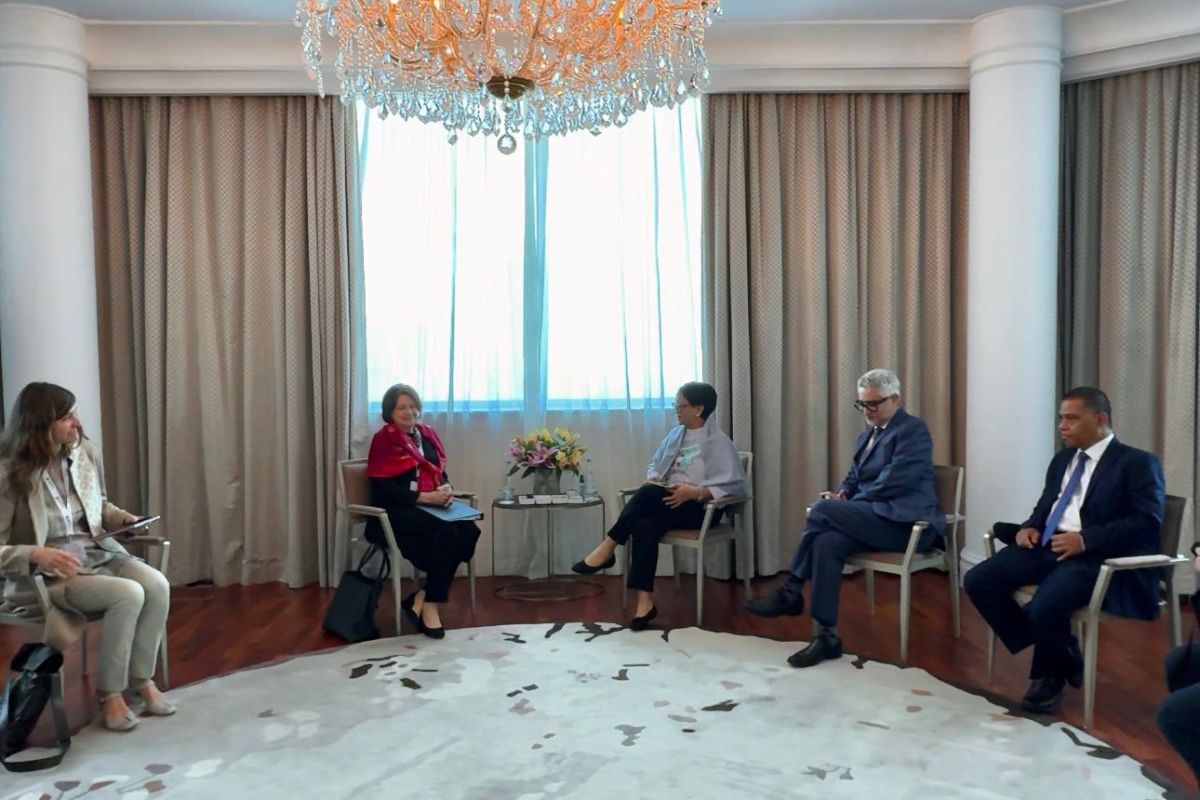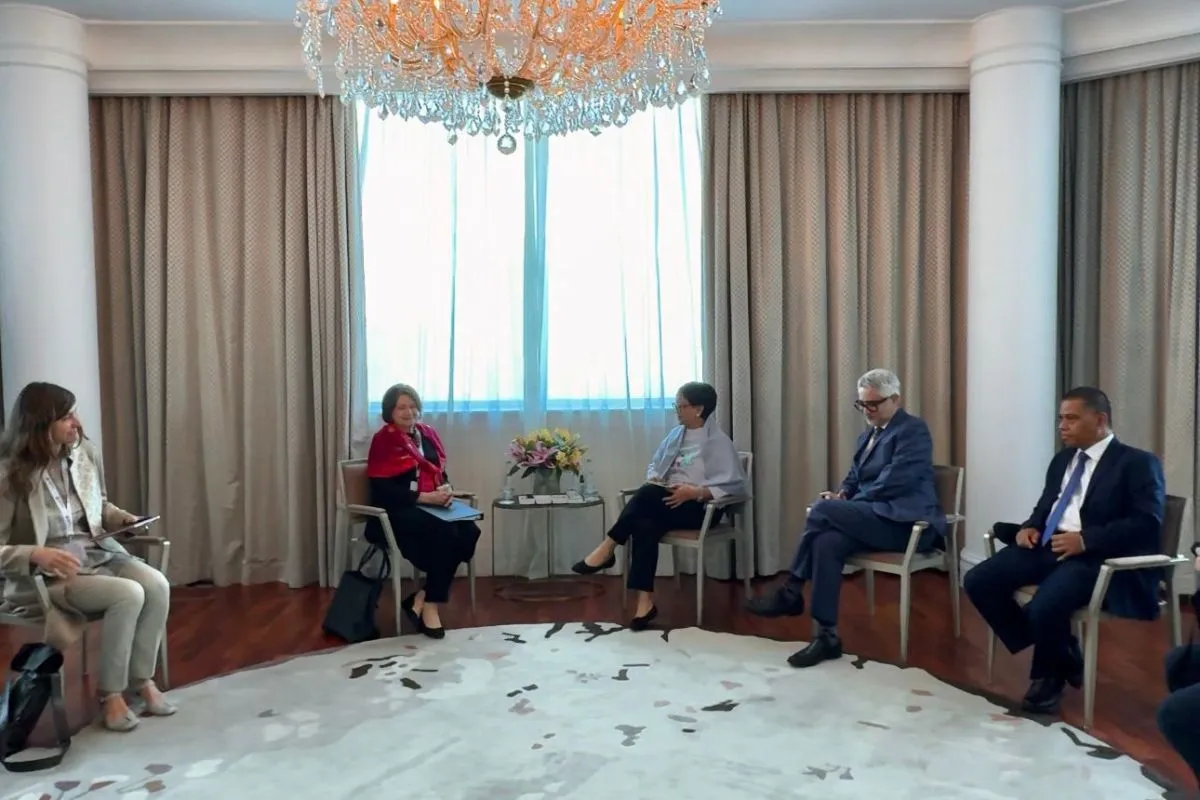Jakarta (ANTARA) - Indonesian Foreign Minister Retno Marsudi emphasized that an inclusive economy, involving women, must be part of Afghanistan's economic development.
"I always bring up women's issues in every issue we discuss. In Session I, I also said that rebuilding trust is very important in the banking system," Marsudi noted in a press statement of the Indonesian Foreign Affairs Ministry,on Monday evening (July 1).
The minister made the statement in the first session titled "Enabling Private Sector at the 3rd Meeting of Special Envoys for Afghanistan" or called Doha III in Qatar, Monday.Apart from empowering women, the minister also accentuated the importance of building an enabling environment for the growth of an inclusive private sector.
Marsudi elaborated several steps taken by Indonesia along with Afghanistan such as cooperation with the UN Assistance Mission in Afghanistan (UNAMA) in the field of financial inclusion by developing a sharia microfinance business model.
"Then there is cooperation in developing sharia banking. Communication is currently continuing and for the record, the World Bank, in its presentation, specifically mentioned Indonesia as a country that can make a contribution in this matter," she remarked.
Marsudi also highlighted Indonesia's preparations to establish contacts between Indonesian women entrepreneurs and Afghanistan.
"Another thing I conveyed in Session I was the importance of correct awareness of the sanctions regime to avoid unnecessary impacts on the Afghan economy," she remarked.
The minister then suggested forming a working group to discuss economic cooperation more concretely and involving relevant stakeholders to contribute to economic cooperation. Furthermore, in Session II, which discussed the eradication of narcotics, Marsudi stated that the issue of drugs was not only a matter of concern for Afghanistan but also a problem that would have an impact on the region and the world.
"We need to appreciate the poppy ban policy. The question is what form of support can be provided by the international community so that this policy can improve the welfare of the Afghan people," Marsudi stressed.
The minister referred to the ban on opium cultivation in Afghanistan, which has reduced 95 percent of poppy cultivation in Afghanistan. In this context, Marsudi underscored the need for rehabilitation of drug users, whose number was quite significant and constituted members of the younger generation of Afghanistan.
"Afghanistan's future will be bleak if rehabilitation efforts are not successful," she stressed.
She then emphasized the importance of an inclusive approach and equal treatment policies, where female victims can receive equal treatment. In this context, Indonesia is ready to assist in rehabilitation and reintegration programs in society.
Marsudi then elaborated on the importance of providing alternative economic sources for Afghan people by strengthening the community's economic capacity.
Indonesia has committed to providing alternative livelihoods for two thousand households in Chaparhar District in Nangarhar Province through support for agronomic practices that impact more than 14 thousand Afghans.
"Indonesia also encourages countries that have similar soil and weather characteristics to help the Afghan people in identifying plants that are suitable for development," Marsudi remarked.
Speaking in connection with law enforcement, Marsudi remarked that despite the poppy ban, illegal drug trafficking activities continued unabated and had become a matter of grave concern.
"Therefore, cooperation for law enforcement, especially with neighboring countries, is very important," she emphasized.
Baca juga: 90,132 Indonesian Hajj pilgrims arrive in Saudi Arabia
Baca juga: Indonesia, Saudi Arabia discuss renewable energy investment
The Doha III meeting was chaired by UN Under-Secretary-General for Political Affairs and Peacebuilding Rosemary DiCarlo and attended by the Taliban as the de facto authority (DFA) in Afghanistan.
Representatives from 25 countries, comprising the United States, Indonesia, England, Italy, Japan, South Korea, India, China, Germany, Tajikistan, Uzbekistan, Canada, Norway, Russia, Turkey, Qatar, the United Arab Emirates, and Saudi Arabia, attended the meeting.
Other attendees included representatives from international organizations, including the United Nations, the European Union, the Organization of Islamic Cooperation, and the Asian Development Bank.
"I always bring up women's issues in every issue we discuss. In Session I, I also said that rebuilding trust is very important in the banking system," Marsudi noted in a press statement of the Indonesian Foreign Affairs Ministry,on Monday evening (July 1).
The minister made the statement in the first session titled "Enabling Private Sector at the 3rd Meeting of Special Envoys for Afghanistan" or called Doha III in Qatar, Monday.Apart from empowering women, the minister also accentuated the importance of building an enabling environment for the growth of an inclusive private sector.
Marsudi elaborated several steps taken by Indonesia along with Afghanistan such as cooperation with the UN Assistance Mission in Afghanistan (UNAMA) in the field of financial inclusion by developing a sharia microfinance business model.
"Then there is cooperation in developing sharia banking. Communication is currently continuing and for the record, the World Bank, in its presentation, specifically mentioned Indonesia as a country that can make a contribution in this matter," she remarked.
Marsudi also highlighted Indonesia's preparations to establish contacts between Indonesian women entrepreneurs and Afghanistan.
"Another thing I conveyed in Session I was the importance of correct awareness of the sanctions regime to avoid unnecessary impacts on the Afghan economy," she remarked.
The minister then suggested forming a working group to discuss economic cooperation more concretely and involving relevant stakeholders to contribute to economic cooperation. Furthermore, in Session II, which discussed the eradication of narcotics, Marsudi stated that the issue of drugs was not only a matter of concern for Afghanistan but also a problem that would have an impact on the region and the world.
"We need to appreciate the poppy ban policy. The question is what form of support can be provided by the international community so that this policy can improve the welfare of the Afghan people," Marsudi stressed.
The minister referred to the ban on opium cultivation in Afghanistan, which has reduced 95 percent of poppy cultivation in Afghanistan. In this context, Marsudi underscored the need for rehabilitation of drug users, whose number was quite significant and constituted members of the younger generation of Afghanistan.
"Afghanistan's future will be bleak if rehabilitation efforts are not successful," she stressed.
She then emphasized the importance of an inclusive approach and equal treatment policies, where female victims can receive equal treatment. In this context, Indonesia is ready to assist in rehabilitation and reintegration programs in society.
Marsudi then elaborated on the importance of providing alternative economic sources for Afghan people by strengthening the community's economic capacity.
Indonesia has committed to providing alternative livelihoods for two thousand households in Chaparhar District in Nangarhar Province through support for agronomic practices that impact more than 14 thousand Afghans.
"Indonesia also encourages countries that have similar soil and weather characteristics to help the Afghan people in identifying plants that are suitable for development," Marsudi remarked.
Speaking in connection with law enforcement, Marsudi remarked that despite the poppy ban, illegal drug trafficking activities continued unabated and had become a matter of grave concern.
"Therefore, cooperation for law enforcement, especially with neighboring countries, is very important," she emphasized.
Baca juga: 90,132 Indonesian Hajj pilgrims arrive in Saudi Arabia
Baca juga: Indonesia, Saudi Arabia discuss renewable energy investment
The Doha III meeting was chaired by UN Under-Secretary-General for Political Affairs and Peacebuilding Rosemary DiCarlo and attended by the Taliban as the de facto authority (DFA) in Afghanistan.
Representatives from 25 countries, comprising the United States, Indonesia, England, Italy, Japan, South Korea, India, China, Germany, Tajikistan, Uzbekistan, Canada, Norway, Russia, Turkey, Qatar, the United Arab Emirates, and Saudi Arabia, attended the meeting.
Other attendees included representatives from international organizations, including the United Nations, the European Union, the Organization of Islamic Cooperation, and the Asian Development Bank.


